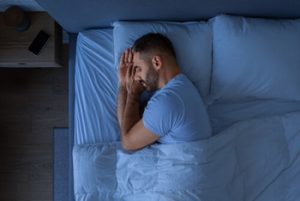
Headaches and sleep share a complicated relationship. When pain sets in at night, drifting off can feel impossible, and poor sleep can make headaches worse the next day. If you have ever tossed and turned, wishing your head would just stop pounding so you could fall asleep, you are not alone. Many people across the general population experience nighttime headaches or trouble sleeping due to migraine pain, tension headaches, or even a rare condition called hypnic headache, often called the alarm clock headache because it wakes patients suddenly during the night.
Understanding how to sleep with a headache is about more than relief in the moment. It also means protecting long-term sleep quality, reducing migraine triggers, and supporting your overall physical health.
Why Headaches and Sleep Problems Are Connected
Sleep and headache disorders often overlap. People who experience chronic migraine, cluster headaches, or other primary headache disorders are more likely to report poor sleep quality or difficulty staying asleep. This connection is not fully understood, but researchers believe changes in the brain’s pain pathways, circadian rhythm, and chemical signals all play a role.
Can lack of sleep cause headaches?
Yes, sleep deprivation is a well-known trigger for many headache disorders, including migraines and tension type headaches. When you do not get enough sleep, the brain’s pain regulation pathways become more sensitive, making it easier for headaches to start. Even one night of poor sleep can cause morning headaches, while chronic sleep difficulties often lead to more frequent migraine attacks. Prioritizing enough sleep and keeping a consistent bedtime routine is one of the best ways to prevent these headaches.
 Why do headaches get worse at night?
Why do headaches get worse at night?
Headaches may feel worse at night for several reasons. Muscle tension from stress throughout the day can intensify once you lie down and relax. Changes in posture, such as lying in a position that strains the neck, can also make pain more noticeable. Some headache disorders, like cluster headaches and hypnic headaches, are closely linked to circadian rhythm and tend to strike at night. Identifying the underlying pattern is key to choosing the right treatment.
Common Types of Nighttime Headaches
Migraines That Interrupt Sleep
Migraines are more than just head pain. They can cause nausea, facial pain, sensitivity to light, and a throbbing sensation that makes it hard to fall asleep. Some people with episodic migraine experience attacks only occasionally, while others face chronic migraine, lasting more than three months, with frequent flare-ups that interfere with rest.
Tension Headaches
These headaches often feel like a tight band across the forehead or pressure around the temples and neck. They may be linked to stress, poor sleep habits, and muscle strain, including shoulder pain or neck tension that worsens when lying down.
Cluster Headaches
Cluster headaches are extremely painful headaches that can strike at night, often at the same time each night. They are short but intense and disrupt sleep quality severely for patients who experience them.
Hypnic Headaches
This rare sleep disorder, often called the alarm clock headache, wakes people up in the middle of the night with a dull, persistent pain. Unlike migraines or tension headaches, hypnic headaches only occur during sleep.
Why It’s So Hard to Fall Asleep with Head Pain
When your head is pounding, lying in bed can feel like torture. You may experience trouble falling asleep because of pain itself, but also because of the anxiety that builds when you anticipate a poor night’s sleep. Regularly waking in the night or staying awake for hours can further reduce sleep quality.
Your sleep position, bedroom environment, and bedtime habits all matter. Stress, use of electronic devices close to bedtime, large meals late at night, or too much caffeine can make sleep difficulties worse, especially if headaches are already present.
Practical Strategies for Sleeping with a Headache
Create the Right Sleep Environment
A quiet room, a comfortable bed, and a cool temperature are essential. Lowering light exposure before bedtime helps regulate circadian rhythm, making it easier to fall asleep. Consider blackout curtains, earplugs, or white noise if outside distractions are a problem.
Choose the Best Sleep Position
Your sleep position can influence head and neck pain. Sleeping on your back with a supportive pillow often reduces tension in the neck. Side sleeping can help if you snore or experience sleep apnea, another medical condition linked to headaches. Avoid sleeping on your stomach, as this can strain the neck and worsen headache symptoms.
Use Relaxation Techniques
Stress often contributes to headaches. Deep breathing, progressive muscle relaxation, or guided meditation before bed can calm the body and reduce headache intensity. Gentle stretching for the neck and shoulders may also help.
Avoid Caffeine and Large Meals Before Bed
Caffeine close to bedtime can prevent you from falling asleep and may even trigger a migraine attack in sensitive individuals. Similarly, heavy or large meals late at night can disrupt digestion and contribute to poor sleep. Drinking plenty of water during the day but limiting fluid intake right before bed can also reduce nighttime waking.
Apply Cold or Warm Compresses
Some people find relief with a cold pack placed on the forehead or a warm compress on the back of the neck. Experimenting with temperature therapy can help ease pain enough to drift off.
Managing Sleep Habits to Reduce Headaches
Keep a Regular Bedtime
Going to bed and waking up at the same time every day, even on weekends, stabilizes your body’s circadian rhythm. This consistency reduces the likelihood of headaches triggered by irregular sleep schedules.
Limit Screen Time
Electronic devices emit blue light, which interferes with melatonin production and makes it harder to fall asleep. Aim to put away phones, tablets, or laptops at least an hour before bed.
Prioritize More Sleep
Many patients underestimate the impact of sleep deprivation. Adults generally need seven to nine hours per night, but quality sleep matters as much as quantity. If you regularly wake in the night or feel unrested despite enough sleep, a sleep disorder could be involved.
When Headaches Signal a Bigger Sleep Issue
Some headache disorders are directly linked to sleep difficulties. For example:
- Hypnic headaches occur only during sleep and often last 15 minutes to four hours.
- Cluster headaches may repeatedly wake patients at night.
- Poor sleep quality and sleep deprivation can worsen both episodic migraine and chronic migraine.
- Sleep apnea and other sleep disorders may also present with headaches upon waking.
If you notice headaches happening more than three months in a row, if nighttime headaches wake you often, or if you have severe trouble staying asleep, it is important to seek medical advice.
Treatment Options and Professional Guidance
A healthcare provider can help determine whether your headaches are related to a primary headache disorder, a sleep disorder, or another medical condition. They may recommend lifestyle changes, preventive medication, or a tailored treatment plan.
 Possible treatments include:
Possible treatments include:
- Preventive migraine medication to reduce the frequency of migraine attacks.
- Prescription treatments for hypnic headaches.
- Sleep studies to rule out conditions like sleep apnea.
- Stress management or cognitive behavioral therapy for sleep problems.
Lifestyle Changes That Support Better Sleep and Fewer Headaches
Improving sleep quality often requires daily attention. Some helpful steps include:
- Establishing a calming bedtime routine signals to the body that it is time to sleep.
- Reducing stress through regular exercise, journaling, or mindfulness practices.
- Avoiding alcohol and nicotine, which can both disturb sleep and trigger headaches.
- Adjusting diet to reduce migraine triggers, such as certain processed foods.
Final Thoughts: Working Toward Restful Nights
Headaches at night can feel overwhelming, especially when they repeatedly interfere with sleep. Whether you are dealing with migraine symptoms, tension-type headache, cluster headaches, or the rare alarm clock headache, finding relief requires patience and a plan.
Small lifestyle changes, improved sleep habits, and adjustments to your sleep environment can go a long way toward achieving a restful night. If pain continues to wake you or disrupts your ability to get enough sleep, consult a doctor or specialist. Together, you and your healthcare provider can develop treatments that not only improve your sleep but also reduce headache frequency and severity.
Quality sleep is essential for healing, physical health, and resilience. By focusing on both headache treatment and sleep hygiene, you can take steps toward better nights and brighter mornings.
References:
https://www.webmd.com/migraines-headaches/features/tension-headache-explain
https://my.clevelandclinic.org/health/diseases/hypnic-headache
https://www.verywellhealth.com/headache-from-lack-of-sleep-5218116
https://www.mayoclinic.org/diseases-conditions/chronic-daily-headaches/expert-answers/nighttime-headaches/faq-20057919
https://www.medicalnewstoday.com/articles/320133

